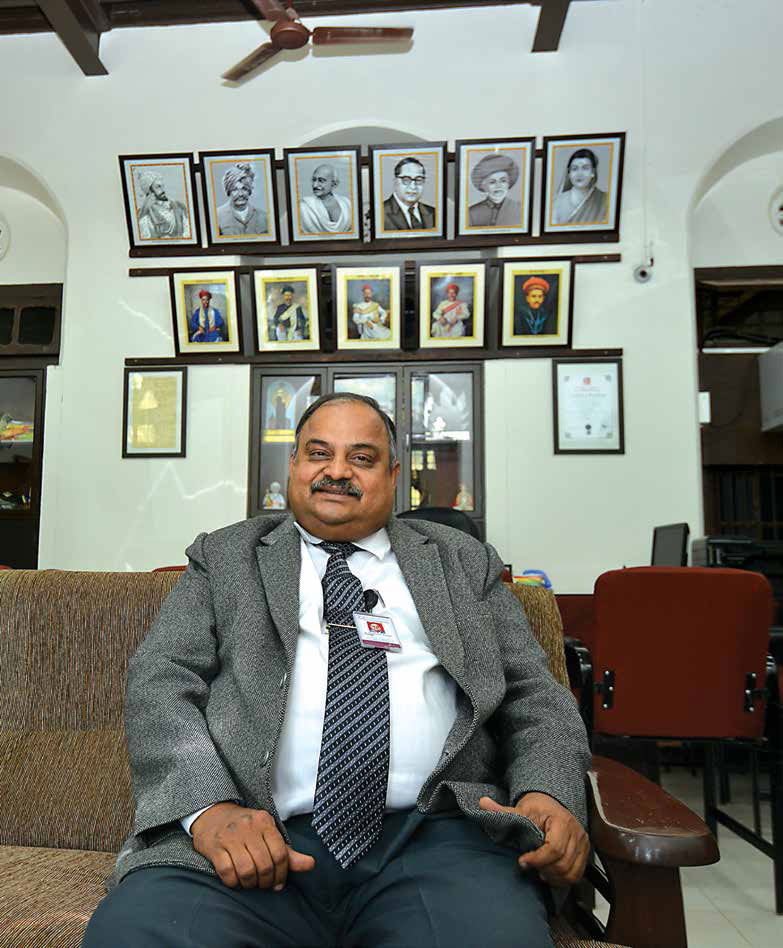
Fergusson College has a history as rich and storied as the history of Independent India. Established in 1885 on the then outskirts of the Pune city, Fergusson College (FC) is the first privately governed college in India. While it is named after Scottish-born Bombay Province Governor Sir James Fergusson, the institutes's roots are wholeheartedly Indian. So much so, that even Mahatma Gandhi showered praise on the institution in a personal message to the then Principal Dr Mahajani. From its connection to the Indian independence movement to its role in shaping up the lives of some of the most accomplished alumni in every possible field, FC has always lived up to its remarkable tradition of excellence. The greatest quality about FC, however, is not its stellar legacy, but its ability to adapt to the present and pioneer educational innovations to stay ahead of the curve. Corporate Citizen meets Principal Dr Ravindrasinh Pardeshi to understand the glorious past, the spectacular present and his future plans for the institute. We also try to find out what is it about the college that inspires the best political minds, evidenced by the fact that it has produced not one, but two Prime Ministers for the country!
Yes, our founders were Lokmanya Bal Gangadhar Tilak and even before that, Vishnushastri Chiplunkar, who was selected for government service (at that time the British service). However, instead of opting for it, he preferred to be a teacher and that is how with his idea, Lokmanya Tilak, Gopal Ganesh Agarkar, Vishnushastri Chiplunkar, and Mahadev Ballal Namjoshi founded New English School on Tilak Road in 1880. After that they wanted to start a college too, so they sought an approval from the Governor of Bombay Province, Sir James Fergusson. The prime purpose behind their effort was to give nationalistic education to the locals as part of the renaissance movement after the Great Uprising of 1857. Before founding the college, a trust was formed. As such, on October 24, 1884, the Deccan Education Society was formed and at that time, Sir James Fergusson became the first patron of the society by donating a handsome sum. Chhatrapati Shahu Maharaj of Kolhapur also agreed to the request to be the first President of the Deccan Education Society who as a reformist had already started Rajaram College in Kolhapur in 1880.
One of the founders, Gopal Ganesh Agarkar was of the opinion that once our people are educated, we will have a reformed, civilised society and only then can we gain independence from the British rule. Lokmanya Tilak, on the contrary, was of the opinion that independence should be sought first and social reforms later. Both studied at Deccan College and later formed the Society and Fergusson College. As they differed in their opinions, they later separated. Although these two opposite thoughts existed, there was no friction or conflict of ideology in the college education because though they differ greatly, the very basis of these two schools of thought was to provide nationalistic education to the youth of this country. And this has been the guiding principle for the college all these long years.
"In FC, we give freedom to think and that is essential for developing independent thought. Students too come up with so many ideas the year-round. Students are given freedom to express their views and articulate, which leads to overall personality development from all angles"
Fergusson College was founded with an aim to provide nationalistic education to the youth of this country. Lokmanya Tilak, one of the founders was at the forefront of the struggle for the freedom movement. So the nationalistic spirit was very much prevalent in the college. Between 1902 and 1905, Swatantryaveer Savarkar was a student of Fergusson College, staying in its hostel. Later on Acharya Kripalani was also a student of this college. So the atmosphere was full of patriotic fervour. The college authorities, too, would keep on instilling these values into the students, a tradition that continues even today.
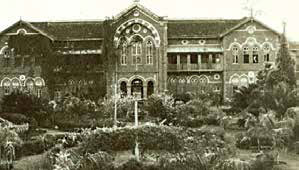
I know only about VP Singh who did BSc Physics here. He being a prince, used to be called 'Raja Saab' and used to come to the college in a horse drawn buggy! Narasimha Rao did his BSc in Mathematics but I personally don't know any anecdotes about him as a student.
In FC, we give freedom to think and that is essential for developing independent thought. The students too come up with so many ideas the year-round. We have many activities, be it cultural, sports, dramatics, debates, etc. Chittatosh and Shivakumar are two recent Fergusson students who have bagged prizes in the recent Loksatta competition for bloggers to critique and comment on a particular issue discussed in a select editorial. In this way, the students are given freedom to express their views and articulate, which leads to overall personality development from all angles.
Yes, for English, we had G. P. Pradhan, the revered professor and socialist leader, affectionately called as Pradhan Master, Prof. K. V. Kelkar for Geology, and for Mathematics we had Wranglers like Prof. Mahajani, etc. So this kind of tradition is here where students come with their ideas and they are mentored and given the right direction and that's how they get shaped.
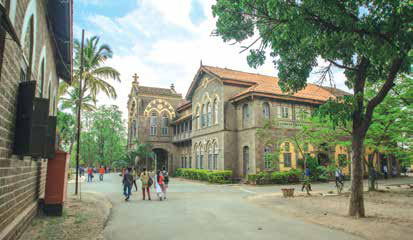
I would attribute this to a few things. FC is a much-preferred college by the toppers. Secondly, the college is known for excellence, we offer the Department of Biotechnology's (DBT) STAR College Scheme, and the Department of Science and Technology's (DST) Fund For improvement of Science & Technology (DST FIST) scheme, etc. This way, students get many avenues for research even at an undergraduate level and get mentored by excellent faculty. This attracts them to our college. At our Astro Club, the students have been organising activities pertaining to astronomy all the year round for the last ten years, including the national seminar and the national conference on their own. Of course, the teachers are there to help them as and when required. There was a NASA hunt for asteroids and four or five of the students, Ziad Modak, Radha, Neha, and Kshitija, discovered three asteroids from the main gate of the college. They are now named after Fergusson College Pune as FCP Pune 09, 014 and 64, in September 2015. Hamsa Padmanabhan is another student who discovered an asteroid four years back and a minor planet was named 'Hamsa' after her, by the Massachusetts Institute of Technology after her presentation at the Intel International Science and Engineering Fair (ISEF) in 2006. She is now doing research in the U.S. Around 42 past students, ex-members of Astro Club, are working as professionals in astrophysics all over the world.
We also apply for schemes introduced by DST (Department of Science and Technology) and the Ministry of Science. These are for funding for research, development of infrastructure and running some programmes as well. The University Grants Commission grants status to select institutes that qualify for 'colleges with potential for excellence' (CPE). Since the time we got accredited, we have crossed the 3.5 mark of the UGC, we are now eligible for the status of 'College with Excellence'. Since a couple of years, we have been trying to get an autonomy status for the college, and we are under process for the same.
"Swatantryaveer Savarkar, Acharya Kripalani, to name a few, were students of this college. So the atmosphere was full of patriotic fervour"
As per our records, on January 27, 1885, Fergusson College was officially affiliated to Bombay University. Pune University was founded in 1948. The University Grants Commission (UGC), which was founded in 1956, earlier had an idea that there shouldn't be more than 50 colleges under a university in order to effectively administer or work on a syllabus, etc. Today with such a huge number of colleges affiliated to any university, and with the burgeoning burden of managing such mammoth operations including conducting exams, it is increasingly felt that the syllabus is not challenging enough or getting updated or is relevant enough to keep up with the changing times. With autonomy, it will help us prepare the syllabus more appropriately, keeping in mind local employability, industry needs and career-specific requirements, even for languages. For example, German language courses were introduced in our college in 1914. Today we offer courses in six languages and the German and French language departments have cultural programmes with German and French universities. Another gripe is that the University has one pattern of examination. Autonomy will give the college the freedom to balance the two options available on this front, rather than the standard yardstick of being judged in one examination.
Right from its beginning, the aim of FC has been to provide nationalistic education to the masses. Therefore even now it has kept a reasonable fee structure and after getting the autonomous status, we will ensure the college fees are reasonable so as to make it affordable to all sections of the society. Under DBT there is a STAR College Scheme, under which some of the Science departments are given special funding, especially to run programmes which would attract students and strengthen undergraduate teaching in Science. Lately, for the last five-six years, we have been successful in getting funding under many such schemes. There are so many overseas universities interacting and collaborating with us and they say our syllabus is very good.
As I said, we don't only stick to the syllabus, we go beyond it. Like I explained earlier, through DBT STAR, DST, UGC, etc., we are able to get experts from different fields, different national laboratories or even at times, overseas experts interacting with our students. So that's definitely giving them an edge over others. Environmental Science is very sought after, but it is just one of many. Computer Science, Electronic Science, Biotechnology, Microbiology -these are departments started in the last 25 years, which are also doing extremely well. Even psychology and humanities, for that matter, are doing good research and are considered one of the best, as are the English and Economics courses.
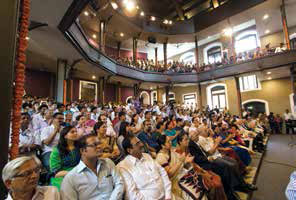
I definitely am. However, change is constant in nature. We cannot have the same kind of professors we did fifty years or hundred years ago. With changing times, students have become smarter; they are e-savvy, tech-savvy and that is how they are updating themselves. At the same time, teachers have become research and development-oriented with their projects, etc., and are thus keeping up with the changing times. So we too accept and adapt to it. The best part is that the quality of teaching is not limited to our internal staff. When it comes to liaisons with overseas universities, we have a tie-up with Penn State University, one of the top universities in the U.S. Students doing their BSc in computer science or electronic science or mathematics and physics, after their BSc degree -which they get from Savitribai Phule Pune University -can get directly admitted into the third year of B.E., which is called B.S. (Bachelor in Science) of engineering in Penn State. We also have tie-ups with Glasgow Caledonian University a Scottish University, where we run the clinical research programme and microbiology. We are also trying for a blended BSc programme with Melbourne University. Like I said, we are interacting with French and German universities, Copenhagen University of Denmark, as well as Arizona State University, US. To answer your question in numbers, there are about 6,000 under-graduateand post-graduate students, the junior college has about 2,500 students. So more than 8,000 students are studying at Fergusson College. The teaching staff is about 300-plus and the supporting staff is 200-plus.
| S.No | Name | Designation |
| 1 | PV Narasimha Rao | Former Prime Minister of India |
| 2 | Vishwanath Pratap Singh | Former Prime Minister of India |
| 3 | Vinayak Damodar Savarkar | Indian independence activist, icon of the Hindu Nationalism ideology |
| 4 | Dr Burgula Ramakrishna Rao | Former Chief Minister of the erstwhile Hyderabad State; activist in the freedom of Hyderabad from Nizam's rule |
| 5 | Babubhai J Patel | Former Chief Minister of Gujarat |
| 6 | Balasaheb Thorat | Member, Maharshtra legislative assembly and current Minister of Revenue and Khar Lands, Government of Maharashtra |
| 7 | Bhalchandra Nemade | Marathi writer of books such as Kosala, Bidhar, Jhool, Jarila, Hool, Hindu -Jagnyachi Samruddha Adgal, winner of the 2014 Jnanpith Award |
| 8 | Pandit Chandrakant Sardeshmukh | Sitar player, first Master Fellow of the National Centre for the Performing Arts (India) |
| 9 | D R Kaprekar | Mathematician, discovered the Kaprekar Constant and the Kaprekar Number |
| 10 | Dattatreya Gopal Karve | Economist, first Principal of Brihan Maharashtra College of Commerce, Pune |
| 11 | Jivatram Bhagwandas Kriplani | Indian independence activist, senior Congress leader, founder of the Praja Socialist Party |
| 12 | Kranti Kanade | National Award-winning film director and screenwriter (Gandhi of the Month, Mahek, Chaitra) |
| 13 | Kiran Nagarkar | Playwright, novelist |
| 14 | Mohommed Ali Shah | Theatre personality, actor and social activist |
| 15 | Nandini Nimbkar | President, Nimbkar Agricultural Research Institute; Member, Senate and Academic Council, Shivaji University |
| 16 | N H Antia | Plastic surgeon and Padma Shri awardee |
| 17 | P L Deshpande | Playwright, actor, icon of modern Marathi literature |
| 18 | Padmanabhan Balaram | Professor and current Director of IISc Bangalore |
| 19 | Damodar Dharmananda Kosambi | Marxist historian, Indologist, mathematician, statistician and former head of the Dept of Mathematics at FC |
| 20 | Pooja Batra | Model, Miss India 1993; actress |
| 21 | Prahlad Kakkar | Ad film-maker |
| 22 | Pralhad Keshav Atre | Playwright, editor, orator |
| 22 | Vasant Kanetkar | Playwright, Padma Shri awardee |
| 23 | Wrangler RP Paranjpe | First Indian to become Senior Wrangler at Cambridge University, former Principal of Feregusson College |
| 24 | Ram Ganesh Gadkari | Playwright |
| 25 | Dr Shreeram Lagoo | Stage and film actor |
| 26 | Smita Patil | Actress, two-time National Award winner for Best Actress |
| 27 | Sonali Kulkarni | Actress, columnist and writer |
The process is full of government norms and regulations which change often and there is delay in the process due to all this. However, as far as Fergusson College is concerned, an advertisement in the newspapers gets a good response.
The role of the teacher keeps evolving. As we say, this is an age of information and technology. So the student comes with an idea before the lecture starts, unlike earlier, when students would get information only after a lecture was delivered. Therefore the teacher has to be one step ahead of the students and that's the real challenge.
Certainly. No doubt it's a challenge, but as far as we are concerned, we get along very well with students. Teachers mentor them well and that is how that tradition is still on. Today, along with the information, other things are also being taken care of.
Although the college is named after Sir James Fergusson, it was only because he helped the founders to form the society, and was also the Governor of Bombay and he donated a sum of Rs.1,200 then. All our founders are Indian, and all our Principals since inception have been Indian. We are an Indian college, heart and soul.
It is a privilege to work in an institute which has been declared a heritage structure. The main college building was completed in 1895. The amphitheatre was built in 1912, and the library was built in 1929. These have been declared as heritage structures. Apart from these, there are many pre-independence-built structures on the premises, which also require a lot of maintenance. The college Trust is very diligent in maintaining these structures, as they are not just invaluable to us; they are a treasure to the nation. In 2012, on the eve of the centenary of the construction of the amphitheatre, it was renovated and made state-of-the-art, while maintaining its century-old aura. The college is situated on 66 acres of land, which takes a lot of work to maintain. However, our alumni and many prominent people have donated over the years to the Trust, which helps us ensure that no stone is left unturned in the upkeep of the college.
We are seeing a renaissance of Pure Sciences, after years of floundering. There are more and more students interested in taking admission in these fields. In Fergusson, fields like Astro-Physics and Psychology are seeing tremendous interest. Today, there is saturation in engineering and other streams
Absolutely. The list is long. Our alumni not only include former prime ministers and freedom fighters, we have a great number of accomplished alumni in every possible field. Ranjan Mathai, the former Foreign Secretary of India, was from FC. Gautam Bambawale, the High Commissioner to Pakistan, Pravin Dixit, the Director General of Police (DGP) Maharashtra, former DGP Ajit Parasnis, and Air Marshal Bhushan Gokhale are notable alumni in the government. Legends in Literature like Ram Ganesh Gadkari, PK Atre, PL Deshpande studied here. Dr Shriram Lagoo, Sonali Kulkarni, Radhika Apte are well known in the entertainment field. In sports, Rohan More, who completed the Triple Crown of Open Water Swimming tournament, Deepika Joseph, who won the gold in kabaddi at the Asian Games in Guangzhou, China, visually challenged and differently-abled Amol Karche led India to victory in the Cricket World Cup for the Blind 2014. Suyash Jadhav has qualified for the paraplegic games at the Olympics in Rio. Nazleen Madraswala (nee Namrata Shah) represented Indian women's hockey at the Olympics. There were seven students who represented India at the Asian games - Sneha Rajguru, Deepika Joseph, Neha Pardeshi and others. In international badminton, we have Rashmi Teltumbde and Anuradha, in basketball, Shruti Menon and Shirin Limaye. Also, extreme sports person Shital Mahajan, who holds five world records and 14 national records in extreme sports. In the scientific and education fields, we have Dr Vijay Kelkar, Dr Bhalchandra Nemade, and Dr Sanjeev Dhurandar who conducted scientific research in the field of gravitation, Dr Vivek Sharma, former Director of the Indian Institute of Sciences, Wrangler Paranjpe, Wrangler Mahajani, Principal Dabholkar, and Professor Ram Takwale who were the vice chancellors of Pune University, Rajan Harshe, who was the Vice Chancellor of Allahabad University.
Nowadays, students prefer to have their own groups in sports, and they often practice a lot at their sports clubs. That is why some of the sporting facilities in the college aren't being used as much. Students are still excelling in sports, but they don't necessarily practise in the college premises. A notable exception is our lawn tennis courts, which are used very frequently by students.
With time, there are changes in society that reflect in the students. Students today are well aware of their rights. They are extremely open and ask questions if they have any doubts. They are more vocal about their views and opinions.
We should respect the fact that there needs to be some election to elect representatives of the students. However, the election process should be performance-oriented. In the past, based on academics, sports, or extracurricular, the toppers in their respective fields would be elected and then there would be an election amongst these toppers to select their final candidate. Such an election process ensures the best representatives are selected and they truly have the betterment of the students in mind
Generally, we do give freedom to the students to decide the content. It is a form of freedom of expression, which should not be squashed. I believe the media should not be censored.
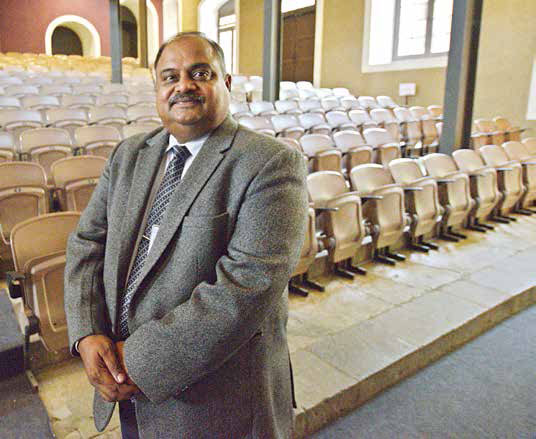
My father worked in the Central Excise Department. When I completed my 12th (HSC) in Solapur, he was transferred to Kolhapur. I was trying to get admission to the engineering stream in Walchand College, Sangli as there were no private colleges at that time. Unfortunately, I couldn't get through in the first cut-off of the merit list. While I was waiting for the second merit list to come out, I decided to take admission in Gokhale College, which was near my house. There I had to select four subjects. I took Geology as one of the subjects as I didn't like Biology. I didn't immediately take a shine to Geology, but later it grew on me. My Geology teacher was pursuing his Ph.D at that time, and he took me with him on study excursions. I took a liking to nature during these visits. At the same time, I got admission to a polytechnic college with a specialization in mining. My father was initially against the idea, as he knew mining was a tough job with a lot of outdoor work in extreme climate. However, since I had taken a liking to Geology, mining felt like a natural progression for me and I joined. Even in college, I loved explaining things to my classmates and friends, and I would be the go-to person in case they needed any clarification. This is where my passion for teaching surfaced. Later I took admission for MSc in University of Pune, after which I got offers in different geological organisations. However, I got a scholarship at the Council of Scientific and Industrial Research. I was there for five years, during which time I went to the Himalayan region over a couple of months as that was my specialisation region. It was then that I got an offer for a temporary teaching position for two years at Fergusson. I loved the work so much that I decided this would be my career.
Interestingly, we are seeing a renaissance of Pure Sciences, after years of floundering. There are more and more students interested in taking admission in these fields. In Fergusson, fields like Astro-Physics and Psychology are seeing tremendous interest. Today, there is saturation in engineering and other streams. Pure Science students, on the other hand, are getting many job offers, especially in the government. Research labs are also on the lookout for these students, and of course, they are always welcome in the teaching field.
To promote teaching activities, I have been able to approach and secure funds from many government organisations. To promote skill-based streams, we have managed to get sanction from the UGC in 2013 to start a Bachelor in Vocation Courses. Under that, we have begun offering BSc in Media and Communication and Digital Art and Animation courses.
The Maharashtra government has said that only 10 percent of the seats should be filled by students from outside the state. Again, there are international students. More than 400 students from 36 different countries have taken admission in our college.
At present, our Computer Science department has almost 100 percent placement. Our Biotechnology and Microbiology departments also get good placements. The placement for our other courses like BA is also on the rise.
We have won the Best College award from Pune University. We also won the 'College with potential' award, 'Heritage status' award and several more over the years.
I am a geologist, so I believe in living on Earth (laughs). I also believe in 'Geo' and Jeene Do. Pun intended.
There is no alternative to hard work in life. Be honest and sincere in your work and you can achieve anything you want.
By Neeraj Varty